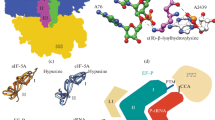Summary
The inhibition of elongation factors G, Tu and Ts by ppGpp was studied in vitro in a translation system with missense frequency and elongation rate similar to those in vivo. ppGpp inhibits EF-G with KI=6x10-5 M. When ppGpp is in twofold excess over GTP and EF-G is the rate-limiting component, the elongation rate is reduced two-fold by ppGpp. EF-Tu is inhibited with KI=7x10-7 M in the absence of EF-Ts. When EF-Ts is added, the binding of ppGpp to EF-Tu becomes successively weaker. 1/KI depends linearly on 1/[Ts] and the intercept at the abscissa gives KI=4x10-5 M. This reflects the binding of ppGpp to the binary TuTs complex. The slope reveals that the binding of EF-Ts to the TuMS binary complex is strong (10-6 M). ppGpp may thus inhibit the cycling of EF-Tu indirectly by the removal of the free EF-Ts by its adsorption to TuMS, as well as directly by simple binding to Tu. EF-Tu inhibition by ppGpp can be fully reversed by high levels of aminoacyl-tRNA only in the presence of EF-Ts and at low ribosomal activity. Our in vitro observations have been extrapolated to in vivo conditions with conclusions as follows: Under strong amino acid starvation ppGpp in two-fold excess over GTP cannot reduce significantly the elongation rate of ribosomes and thereby restore the errors to their normal levels as in the stringent response. Under weak starvation, in contrast, a significant rate reduction can be achieved by the trapping of EF-Ts in complex with TuppGpp.
Similar content being viewed by others
References
Andersson SGE, Buckingham RH, Kurland CG (1984) Does codon composition influence ribosome function? EMBO J 1:91–94
Arai KI, Arai N, Kawakita M, Kaziro Y (1972a) Interaction of guanine-5′-diphosphate, 2′-(or 3′-)disphosphate (ppGpp) with elongation factors from E. coli. Biochem Biophys Res Commun 48:190–196
Arai KI, Kawakita M, Kaziro Y (1972b) Studies on polypeptide elongation factors from Escherichia coli. J Biol Chem 247:7029–7037
Böck A, Faiman LE, Neidhardt FC (1966) Biochemical and genetic characterization of a mutant of Escherichia coli with a temperature sensitive valyl ribonucleic acid synthetase. J Bacteriol 92:1076–1082
Ehrenberg M, Blomberg C (1980) Thermodynamic constraints on kinetic proofreading in biosynthetic pathways. Biophys J 31:333–358
Gallant J (1979) Stringent control in E. coli. In: Roman HLK, Campbell A, Sandler LM (eds) Annual review of genetics, vol 13. Ann Rev Inc, Palo Alto, California, USA
Gallant J, Harada B (1969) The control of ribonucleic acid synthesis in Escherichia coli. III The functional relationship between purine ribonucleoside triphosphate pool sizes and the rate of ribonucleic acid accumulation. J Biol Chem 244:3125–3132
Gallant J, Foley D (1979) On the causes and prevention of mistranslation. In: Koch G, Richter D (eds) Regulation of macromolecular synthesis by low molecular weight mediators. Academic Press Inc, New York
Gouy M, Grantham R (1980) Polypeptide elongation and tRNA cycling in Escherichia coli: A dynamic approach. FEBS Lett 115:151–155
Hamel E (1976) Derivatives of guanosine triphosphate with ribose 2′-hydroxyl substituents. Interactions with the protein synthetic enzymes of Escherichia coli. Eur J Biochem 70:339–347
Hamel E, Cashel M (1973) Role of guanine nucleotides in protein synthesis. Elongation factor G and guanosine 5′-triphosphate, 3′-diphosphate. Proc Natl Acad Sci USA 70:3250–3254
Jelenc PC (1980) Rapid purification of highly active ribosomes from Escherichia coli. Anal Biochem 105:369–374
Jelenc PC, Kurland CG (1979) Nucleoside triphosphate regeneration decreases the frequency of translation errors. Proc Natl Acad Sci USA 76:3174–3178
Kurland CG, Ehrenberg M (1984) Optimization of translational accuracy. Progr Mol Biol Nucl Acids Res, in press
Leberman R, Antonsson B, Giovanelli R, Guariguata R, Schumann R, Wittinghofer A (1980) A simplified procedure for the isolation of bacterial polypeptide elongation factor EF-Tu. Anal Biochem 104:29–36
Legault L, Jeantet C, Gros F (1972) Inhibition of in vitro protein synthesis by ppGpp. FEBS Lett 27:71–75
Lipmann F (1969) Polypeptide chain elongation in protein biosynthesis. Science 164:1024–1031
Maaløe O (1979) Regulation of the protein-synthesizing machinery-ribosomes, tRNA, factors and so on. In: Goldberger RF (ed) Biological regulation and development. Plenum Press, New York, p 487–542
Miller DL, Cashel M, Weissbach H (1973) The interaction of guanosine 5′-diphosphate, 2′(3′)-diphosphate with the bacterial elongation factor Tu. Arch Biochem Biophys 154:675–682
O'Farrell PH (1978) The suppression of defective translation by ppGpp and its role in the ttringent response. Cell 14:545–557
Piepersberg W, Geyl D, Buckel P, Böck A (1979) Studies on the coordination of tRNA-charging and polypeptide synthesis activity in E. coli. In: Koch G, Richter D (eds) Regulation of macromolecular synthesis by low molecular weight mediators. Academic Press Inc, New York
Pingoud A, Gast F-U, Block W, Peters F (1983) The elongation factor Tu from Escherichia coli, amino acyl-tRNA, and guanosine tetraphosphate form a ternary complex which is bound by programmed ribosomes. J Biol Chem 258:14200–14205
Ruusala T, Ehrenberg M, Kurland CG (1982a) Catalytic effects of elongation factor Ts on polypeptide synthesis. EMBO J 1:75–78
Ruusala T, Ehrenberg M, Kurland CG (1982b) Is there proof reading during polypeptide synthesis? EMBO J 1:741–745
Ryals J, Little R, Bremer H (1982) Control of rRNA and tRNA syntheses in Escherichia coli by guanosine tetraphosphate. J Bacteriol 151:1261–1268
Wagner EGH, Kurland CG (1980) Translational accuracy enhanced in vitro by (p)ppGpp. Mol Gen Genet 180:139–145
Wagner EGH, Ehrenberg M, Kurland CG (1982a) Kinetic suppression of translational erros by (p)ppGpp. Mol Gen Genet 185:269–274
Wagner EGH, Jelenc PC, Ehrenberg M, Kurland CG (1982b) Rate of elongation of polyphenylalanine in vitro. Eur J Biochem 122:193–197
Yegian CD, Stent GS (1969) An unusual condition of leucine transfer RNA appearing during leucine starvation of E. coli. J Mol Biol 39:45–58
Author information
Authors and Affiliations
Additional information
Communicated by A. Böck
Rights and permissions
About this article
Cite this article
Rojas, AM., Ehrenberg, M., Andersson, S.G.E. et al. ppGpp inhibition of elongation factors Tu, G and Ts during polypeptide synthesis. Mol Gen Genet 197, 36–45 (1984). https://doi.org/10.1007/BF00327920
Received:
Issue Date:
DOI: https://doi.org/10.1007/BF00327920




